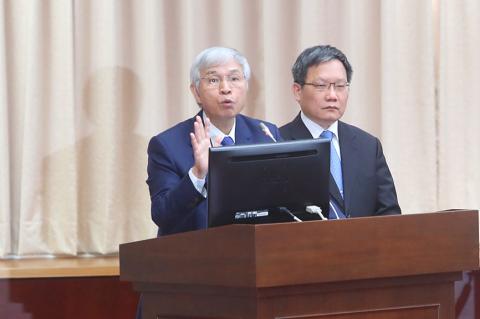The central bank yesterday kept policy rates unchanged for the 10th consecutive quarter, saying that a global economic slowdown and the US-China trade dispute merited a lenient policy.
The monetary policymaker trimmed its GDP growth forecast for this year to 2.68 percent from the 2.7 percent it predicted in September, and is anticipating a 2.33 percent pickup next year.
“The domestic stock rout has taken a toll on consumer spending, while economic weakness in major trading partners might dampen external demand,” central bank Governor Yang Chin-long (楊金龍) told a news conference after the bank’s quarterly board meeting.

Photo: CNA
Against this backdrop, the board unanimously agreed to hold the rediscount rate steady at 1.375 percent, the collateralized loan rate at 1.75 percent and the unsecured loan rate at 3.625 percent.
The downward GDP growth revision came after international research institutes cut forecasts for major economies and turned cautious, Yang said.
Taiwan, home to some of the world’s biggest electronic component suppliers, is susceptible to cyclical global technology corrections and effects of hostile tariff exchanges between Washington and Beijing, as such components account for more than half of all exports.
A conservative outlook led the bank to keep its target range for broad money supply next year unchanged at 2.5 percent to 6.5 percent, Yang said.
The bank expects consumer prices to increase 1.05 percent next year, while the consumer price index, a reliable long-term price tracker, would advance at a milder 0.93 percent, Yang said.
International oil prices have stabilized, easing imported inflationary pressures, the governor said, adding that stable consumer prices gave the bank room to adopt an accommodative monetary policy.
Yang declined to comment on policy rate changes next year, saying that the bank would base its decisions on the latest economic figures.
“Moves by other central banks will serve as a reference, but will not be the decisive factor,” he said.
Yang, who has a doctorate in economics, declined to comment on movements of the US dollar or capital flows, saying that most predictions have proved to be inaccurate.
He dismissed criticism that the bank failed to do anything to curb capital flight to pursue higher returns in US dollar-denominated assets following a series of rate hikes by the US Federal Reserve.
The capital outflows wreaked havoc on the local bourse, but also led to higher dividend payouts this year, Yang said.
Dividend payouts this year totaled NT$1.4 trillion (US$45.3 billion), up 11.8 percent from last year, with NT$460 billion wired overseas to foreign investors, the bank said.

KEEPING UP: The acquisition of a cleanroom in Taiwan would enable Micron to increase production in a market where demand continues to outpace supply, a Micron official said Micron Technology Inc has signed a letter of intent to buy a fabrication site in Taiwan from Powerchip Semiconductor Manufacturing Corp (力積電) for US$1.8 billion to expand its production of memory chips. Micron would take control of the P5 site in Miaoli County’s Tongluo Township (銅鑼) and plans to ramp up DRAM production in phases after the transaction closes in the second quarter, the company said in a statement on Saturday. The acquisition includes an existing 12 inch fab cleanroom of 27,871m2 and would further position Micron to address growing global demand for memory solutions, the company said. Micron expects the transaction to

Vincent Wei led fellow Singaporean farmers around an empty Malaysian plot, laying out plans for a greenhouse and rows of leafy vegetables. What he pitched was not just space for crops, but a lifeline for growers struggling to make ends meet in a city-state with high prices and little vacant land. The future agriculture hub is part of a joint special economic zone launched last year by the two neighbors, expected to cost US$123 million and produce 10,000 tonnes of fresh produce annually. It is attracting Singaporean farmers with promises of cheaper land, labor and energy just over the border.

US actor Matthew McConaughey has filed recordings of his image and voice with US patent authorities to protect them from unauthorized usage by artificial intelligence (AI) platforms, a representative said earlier this week. Several video clips and audio recordings were registered by the commercial arm of the Just Keep Livin’ Foundation, a non-profit created by the Oscar-winning actor and his wife, Camila, according to the US Patent and Trademark Office database. Many artists are increasingly concerned about the uncontrolled use of their image via generative AI since the rollout of ChatGPT and other AI-powered tools. Several US states have adopted

A proposed billionaires’ tax in California has ignited a political uproar in Silicon Valley, with tech titans threatening to leave the state while California Governor Gavin Newsom of the Democratic Party maneuvers to defeat a levy that he fears would lead to an exodus of wealth. A technology mecca, California has more billionaires than any other US state — a few hundred, by some estimates. About half its personal income tax revenue, a financial backbone in the nearly US$350 billion budget, comes from the top 1 percent of earners. A large healthcare union is attempting to place a proposal before